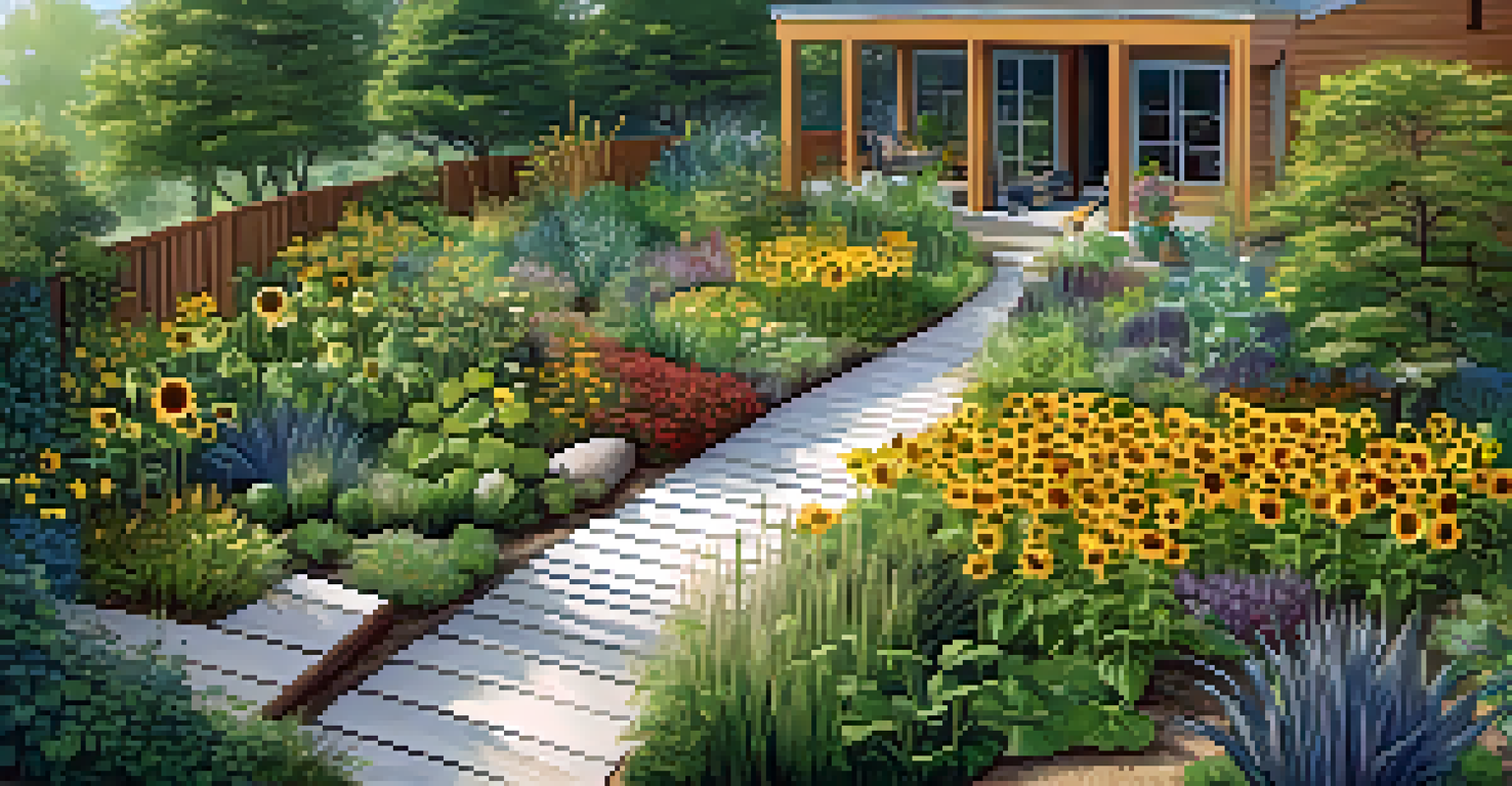The Importance of Biodiversity in Home Gardens Explained

What is Biodiversity and Why Does It Matter?
Biodiversity refers to the variety of life on Earth, including different species of plants, animals, and microorganisms. It plays a critical role in maintaining the health of ecosystems, which in turn supports life as we know it. In home gardens, biodiversity is not just about aesthetics; it provides essential services like pollination, pest control, and soil fertility.
The diversity of life is the one true treasure that we have, and that we must protect.
Imagine a garden filled with only one type of plant; it may look uniform, but it would struggle to thrive. A diverse garden, on the other hand, creates a balanced environment where various organisms can coexist, promoting resilience against diseases and climate fluctuations. This balance is vital for sustaining the plants and wildlife that inhabit it.
In essence, biodiversity enhances the beauty and productivity of home gardens while contributing to the overall health of our planet. By fostering a diverse ecosystem in our backyards, we can help secure the future of both our gardens and the environment.
Benefits of Biodiversity in Home Gardens
One of the most significant benefits of biodiversity is the promotion of a healthy ecosystem. Diverse plant species can attract a variety of beneficial insects, such as pollinators like bees and butterflies, which are crucial for the reproduction of many plants. With more pollinators around, your garden can flourish, producing more fruits and flowers.

Moreover, having a mix of plants can help deter pests naturally. Certain plants can repel harmful insects or attract predators that feast on those pests. This natural pest control reduces the need for chemical pesticides, promoting a healthier environment for both gardeners and wildlife alike.
Biodiversity Boosts Garden Health
A diverse range of plants attracts beneficial insects and improves soil health, leading to a thriving ecosystem.
Additionally, a biodiverse garden contributes to soil health. Different plants have varying root structures and nutrient requirements, which helps to improve soil structure and fertility. This means your garden can produce healthier plants, leading to a more abundant harvest and a vibrant outdoor space.
How to Create a Biodiverse Home Garden
Creating a biodiverse garden starts with selecting a variety of plants. Choose native species, as they are adapted to the local climate and soil, making them more resilient. Incorporate a mix of flowers, vegetables, and herbs to attract different wildlife and create a balanced ecosystem.
Biodiversity is essential for ecosystem services, resilience, and human well-being.
Layering your plants is another effective strategy. Plant taller species to provide shade for smaller plants, and consider ground cover plants to protect the soil. This not only enhances visual appeal but also creates different microhabitats that can support various organisms.
Lastly, remember to include elements like water features or bird feeders. These additions can attract even more wildlife to your garden, further increasing its biodiversity. By taking these steps, you’ll create a garden that thrives and supports a rich variety of life.
The Role of Pollinators in Biodiversity
Pollinators, such as bees, butterflies, and birds, are essential components of biodiversity in home gardens. They facilitate the reproduction of many flowering plants by transferring pollen from one bloom to another. This process not only helps to produce fruits and seeds but also sustains the plant populations that depend on them.
To attract pollinators, consider planting a variety of flowers that bloom at different times throughout the growing season. This ensures that there is always a food source available for these important creatures. Additionally, avoiding pesticides will create a safer environment for pollinators to thrive.
Pollinators Enhance Plant Growth
By attracting pollinators like bees and butterflies, diverse gardens ensure better fruit and seed production.
Creating a diverse garden with well-planned pollinator-friendly plants can significantly boost your garden's productivity. By fostering a safe haven for these vital species, you contribute to a healthier ecosystem and, ultimately, a more fruitful garden.
Companion Planting for Biodiversity
Companion planting is a gardening technique that involves planting different crops in close proximity for mutual benefit. This practice not only enhances biodiversity but also improves the overall health of your garden. For instance, planting marigolds can deter pests while attracting beneficial insects, creating a win-win situation.
When you strategically pair plants, you can create a natural balance in your garden. For example, tomatoes and basil are known companions; basil can enhance the flavor of tomatoes and repel harmful insects. By understanding these relationships, you can design a garden that thrives naturally.
Incorporating companion planting into your home garden encourages biodiversity and reduces reliance on chemical treatments. This approach not only leads to healthier plants but also offers a more diverse array of produce, enriching your harvest and your culinary experiences.
The Importance of Soil Health and Biodiversity
Healthy soil is the foundation of any successful garden, and biodiversity plays a crucial role in maintaining soil health. A diverse array of plants promotes a rich ecosystem of soil microorganisms, which are vital for nutrient cycling and soil structure. These tiny organisms help break down organic matter, making nutrients available for plants.
Incorporating various plant species can also prevent soil erosion and improve water retention. Deep-rooted plants can stabilize the soil, while others may help to retain moisture, ensuring that your garden has the resources it needs to thrive. This balance is essential, especially during dry spells.
Soil Health Depends on Diversity
Biodiversity promotes a rich ecosystem of soil microorganisms, essential for nutrient cycling and soil stability.
By enhancing soil health through biodiversity, you create a sustainable environment for your plants to flourish. This not only leads to better yields but also supports a vibrant community of organisms that contribute to the overall health of your garden.
Connecting with Nature Through Biodiverse Gardens
Creating a biodiverse garden is not just beneficial for the environment; it can also enhance our connection to nature. Spending time in a garden filled with various plants and wildlife offers a peaceful retreat and a chance to observe the beauty of the natural world. This connection can have profound effects on our mental and emotional well-being.
Gardening can also become a family activity, where everyone can learn about different species and their roles in the ecosystem. Kids can enjoy exploring the garden, discovering insects, and understanding the importance of nurturing their environment. This hands-on experience fosters respect and appreciation for nature.

Ultimately, a biodiverse garden enriches our lives in many ways, providing an opportunity to unwind, learn, and connect with the world around us. By investing in biodiversity, we nurture not just our gardens, but also the relationships we have with nature.